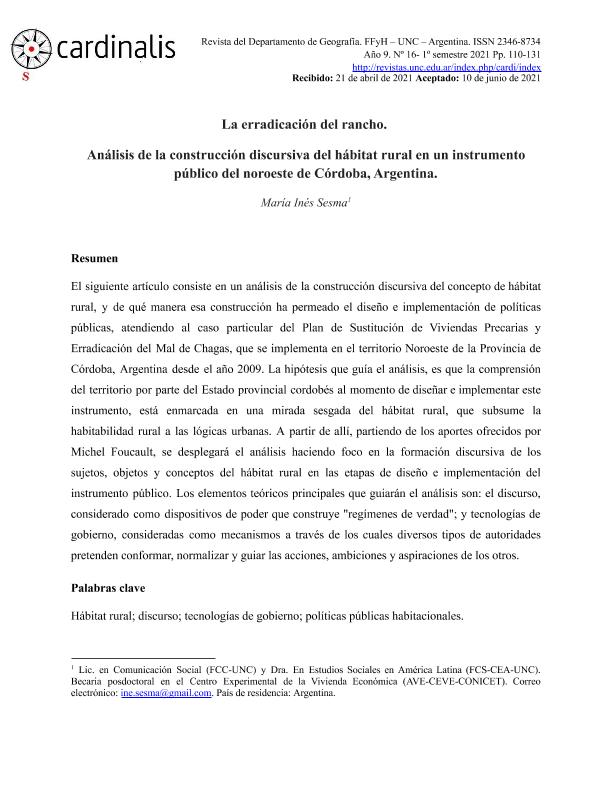Mostrar el registro sencillo del ítem
dc.contributor.author
Sesma, María Inés

dc.date.available
2022-10-13T18:29:02Z
dc.date.issued
2021-08
dc.identifier.citation
Sesma, María Inés; La erradicación del rancho: Análisis de la construcción discursiva del hábitatrural en un instrumentopúblico del noroeste de Córdoba, Argentina.; Universidad Nacional de Córdoba. Facultad de Filosofía y Humanidades. Departamento de Geografía; Cardinalis; 16; 8-2021; 110-131
dc.identifier.issn
2346-8734
dc.identifier.uri
http://hdl.handle.net/11336/173108
dc.description.abstract
El siguiente artículo consiste en un análisis de la construcción discursiva del concepto de hábitat rural, y de qué manera esa construcción ha permeado el diseño e implementación de políticas públicas, atendiendo al caso particular del Plan de Sustitución de Viviendas Precarias y Erradicación del Mal de Chagas, que se implementa en el territorio Noroeste de la Provincia de Córdoba, Argentina desde el año 2009. La hipótesis que guía el análisis, es que la comprensión del territorio por parte del Estado provincial cordobés al momento de diseñar e implementar este instrumento, está enmarcada en una mirada sesgada del hábitat rural, que subsume la habitabilidad rural a las lógicas urbanas. A partir de allí, partiendo de los aportes ofrecidos por Michel Foucault, se desplegará el análisis haciendo foco en la formación discursiva de los sujetos, objetos y conceptos del hábitat rural en las etapas de diseño e implementación del instrumento público. Los elementos teóricos principales que guiarán el análisis son: el discurso, considerado como dispositivos de poder que construye "regímenes de verdad"; y tecnologías de gobierno, consideradas como mecanismos a través de los cuales diversos tipos de autoridades pretenden conformar, normalizar y guiar las acciones, ambiciones y aspiraciones de los otros.
dc.description.abstract
The article below consists of an analysis of the discursive construction of the concept of rural habitat and in what way that construction has permeated the design and implementation of public policies, taking into account the case particular of the Plan de Sustitución de Viviendas Precarias y Erradicación del Mal de Chagas, a public instrument implemented in the Northwest territory of the Province of Córdoba, Argentina since 2009. The hypothesis that guides the analysis is that the understanding of the territory by the Cordoba’s provincial state at the time of designing and implementing this instrument, is framed in a closed view of the rural habitat, which subsumes rural habitability to urban logic. From there, based on the contributions offered by Michel Foucault, the analysis will be deployed taking into account the discursive formation of the subjects, objects and concepts of the rural habitat in the different stages of the public instrument. The main theoretical elements that will guide the analysis are: discourse, considered as power devices that build "regimes of truth"; and government technologies, considered as mechanisms through which various types of authorities seek to shape, normalize, and guide the actions, ambitions, and aspirations of others.
dc.format
application/pdf
dc.language.iso
spa
dc.publisher
Universidad Nacional de Córdoba. Facultad de Filosofía y Humanidades. Departamento de Geografía
dc.rights
info:eu-repo/semantics/openAccess
dc.rights.uri
https://creativecommons.org/licenses/by-nc-sa/2.5/ar/
dc.subject
Hábitat rural
dc.subject
Discurso
dc.subject
Tecnologías de gobierno
dc.subject
Políticas públicas habitacionales
dc.subject.classification
Ciencias Sociales Interdisciplinarias

dc.subject.classification
Otras Ciencias Sociales

dc.subject.classification
CIENCIAS SOCIALES

dc.title
La erradicación del rancho: Análisis de la construcción discursiva del hábitatrural en un instrumentopúblico del noroeste de Córdoba, Argentina.
dc.title
The eradication of the “rancho”: Analysis of the discursive construction of the rural habitat in a public instrument from the northwest of Córdoba, Argentina
dc.type
info:eu-repo/semantics/article
dc.type
info:ar-repo/semantics/artículo
dc.type
info:eu-repo/semantics/publishedVersion
dc.date.updated
2022-09-21T18:44:28Z
dc.journal.number
16
dc.journal.pagination
110-131
dc.journal.pais
Argentina

dc.journal.ciudad
Córdoba
dc.description.fil
Fil: Sesma, María Inés. Consejo Nacional de Investigaciones Científicas y Técnicas. Centro Científico Tecnológico Conicet - Córdoba. Centro Experimental de la Vivienda Económica; Argentina
dc.journal.title
Cardinalis
dc.relation.alternativeid
info:eu-repo/semantics/altIdentifier/url/https://revistas.unc.edu.ar/index.php/cardi/article/view/34342
Archivos asociados
